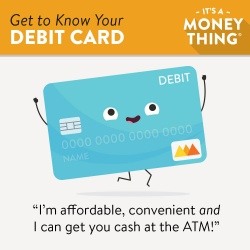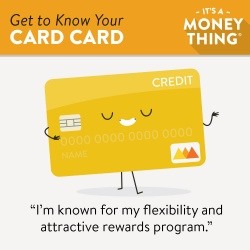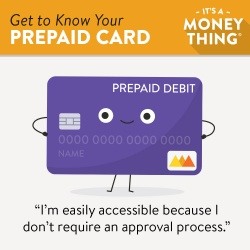What’s The Best Card To Use?
Think fast: what’s the most recent financial decision you made? You likely won’t have to think too far back.
It’s not the last account you opened, or the school loans you consolidated—it’s something much simpler that’s part of your daily routine. Think back to the last thing you purchased—your most recent financial decision was likely what form of payment to use for that transaction.
It’s a decision that comes into play for every bill you pay, every tank of gas you buy and every coffee you pick up on the way to class or work. Cash, check or card? Debit, credit or prepaid debit? You make this decision so many times a day that it might seem common and unimportant. After all, different forms of payment are just different ways to access funds, so what difference does it really make if you put your breakfast sandwich on credit instead of debit?
Well, no payment method is automatically better or worse than any other; it comes down to when and how you use each payment type. Fully understanding each payment type allows you to make smarter decisions, and take advantage of the benefits of each payment type while avoiding any drawbacks.
DEBIT CARDS
The basics
A debit card is linked to your checking account and can be used for point-of-purchase transactions and online transactions, and can also be used to withdraw money from an ATM. A debit card is kind of like an instant personal check. When you pay for something with debit, that amount is transferred from the funds in your account instantly. Although checking accounts sometimes have a monthly fee, it’s generally very affordable.
When used poorly
But there are drawbacks: for example, if a debit transaction takes your available balance below $0, your financial institution will usually allow the transaction to go through, but they’ll charge you an overdraft fee. This is called overdraft protection—without it, your transaction would not go through at all (which could be equally frustrating, depending on the situation). Keeping track of your checking account balance is the best way to avoid overdrawing your account. It’s also important to understand that certain activities (like reserving a rental car, making a hotel reservation or fueling up at a gas station) trigger a hold on your account. This hold, which can last for several days, lowers the available balance in your account. So, if you don’t account for the hold, you might accidentally overdraw your account.
When used responsibly
A debit card is a basic, convenient and affordable payment option. The monthly fees are usually low to start with; also, depending on your package, monthly fees can be waived if you keep a minimum balance in your account. Online access to your checking account, or regularly reviewing your printed statement are also helpful for tracking your expenses and managing your money.
CREDIT CARDS
The basics
A credit card gives you access to a line of credit and can be used to make in-store and online purchases. (It can also be used to withdraw cash from an ATM as a cash advance, but this option is usually extremely costly.) A credit card is kind of like a convenient personal loan. Every time you use it, you’re borrowing money—the card issuer or financial institution covers your purchase, and then you’re responsible for paying them back at a later date. If you’re not able to pay off your balance in full, you pay interest on your outstanding balance. Most credit cards also charge an annual fee.
When used poorly
A credit card can get you into a lot of trouble. Carrying a balance, spending more than you can afford, making late payments (or worse, missing payments entirely), and taking out cash advances are all damaging behaviors. These behaviors can ruin your credit score, making it difficult to secure future loans, mortgages and even jobs. When used irresponsibly, credit cards are an easy way to accumulate debt.
When used responsibly
If you pay off your balance in full and on time each month, credit cards have a lot of advantages. Credit cards are the only form of payment that builds your credit, which is especially important if you are planning to take out a mortgage or car loan in the future. Most credit cards offer some type of rewards or cash-back program, which can be a great way to offset the cost of a credit card’s annual fee. Beyond the rewards programs, some credit cards also offer additional protection for purchases made on the card (examples include an extended warranty when buying electronics or complimentary travel insurance when purchasing flights). Even if you’ve had the same credit card for a while, brush up on its features and see if there’s a benefit you aren’t currently taking advantage of. Of course, none of these perks have any value if you’re caught in the credit debt trap.
PREPAID DEBIT CARDS
The basics
A prepaid debit card is not linked to a line of credit or a checking account. A prepaid debit card is kind of like cash, but in card form. It can be used to make purchases practically anywhere a credit card is accepted—but that’s where the similarities end. A prepaid debit card can only access funds that you’ve loaded on to it, and there are often fees associated with reloading and using the card.
When used poorly
A prepaid debit card can get expensive to operate. Each card has its own fee structure, but if you’re not careful, it’s easy to accumulate higher fees than those charged in a typical checking account.
When used responsibly
A prepaid debit card can offer convenience in certain situations. For example, it can be handy for travel, because if it is lost or stolen, the card can’t be used to gain access to your account or your line of credit.
No matter what combination of payment types you use, it’s worth your time to understand the ins and outs of each. Take some time to learn about the unique features of each of your banking products in order to minimize any possible drawbacks while maximizing the potential benefits.

Was this information useful? Visit our It's A Money Thing home page for more quick videos and helpful articles to help you make sense of your money, one topic at a time! Check back, new topics will be introduced regularly.











